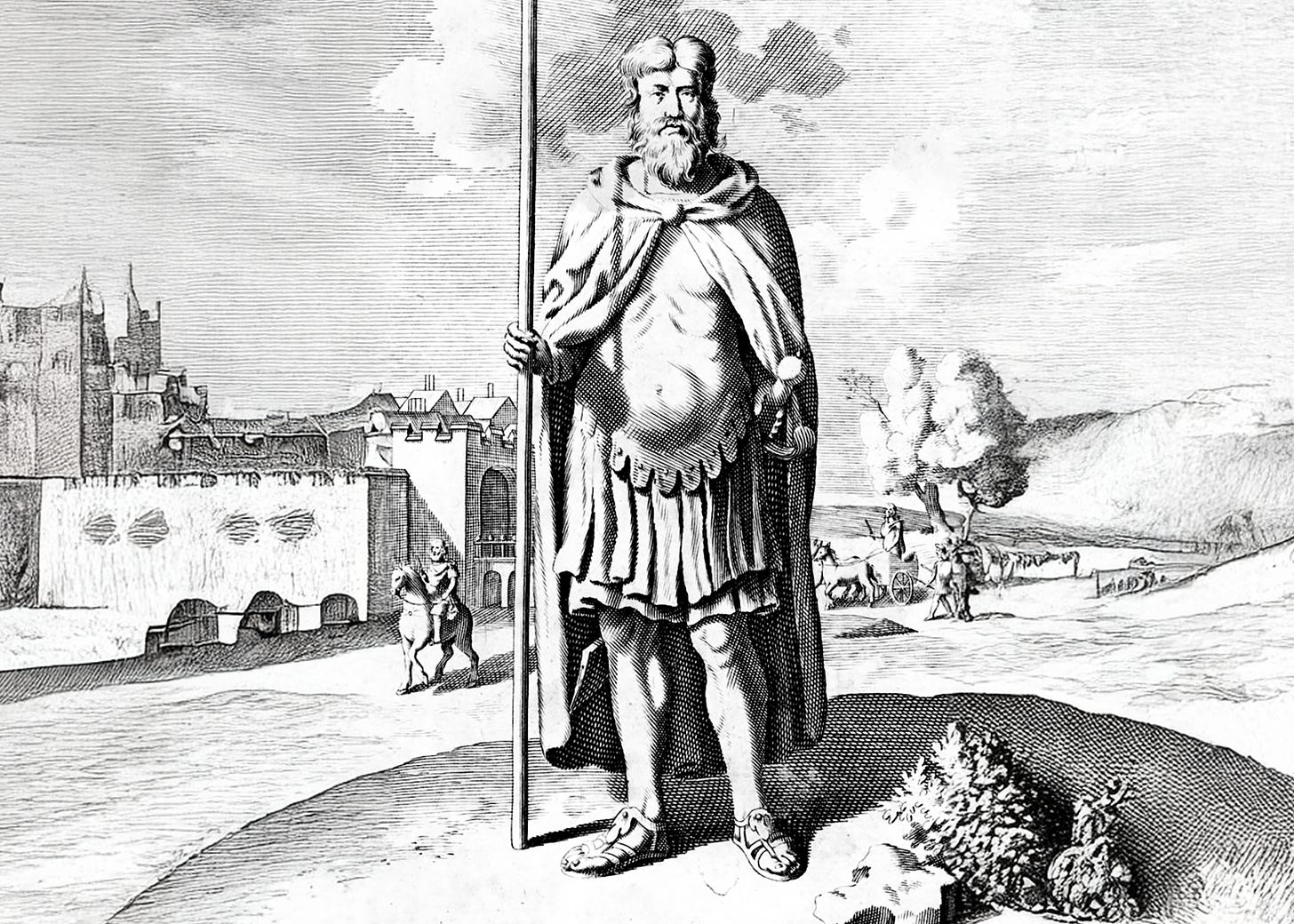
In The Greek Slogan of Freedom and Early Roman Politics in Greece, Sviatoslav Dmitriev explores Rome's manipulation of Greek ideals using epistemological warfare during its expansion into the Mediterranean.
The Roman redefinition of eleutheria (ἐλευθερία, freedom from external domination), autonomia (αὐτονομία, self-governance), and libertas (Roman liberty) served as an ideological weapon to subdue Greece.
By framing its imperial ambitions within the language of benevolence and freedom, Rome reshaped Greek political structures while maintaining the facade of respecting Greek traditions. Dmitriev’s work highlights the sophistication of Roman epistemological warfare, revealing how terms deeply embedded in Greek identity were appropriated to consolidate Roman control.
Thanks to my readers' generosity, all my articles are free to access. Independent journalism, however, requires time and investment. If you found value in this article or any others, please consider sharing or even becoming a paid subscriber, who benefits by joining the conversation in the comments. I want you to know that your support is always gratefully received and will never be forgotten. Please buy me a coffee or as many as you wish.
GPT-Book Summary
Fabius Maximus and the Roman Redefinition of Freedom
Quintus “Q” Fabius Maximus, the namesake of the Fabian Society, emerges as a figure deeply tied to the narrative of Roman epistemological warfare. Known for his methodical military strategies during the Second Punic War, his legacy extended into Rome’s dealings with Greece. His name appears in correspondence that illustrates Rome’s ideological reframing of its actions as protective, benevolent, and aligned with Greek ideals of freedom.
Freedom as a Roman “Gift”
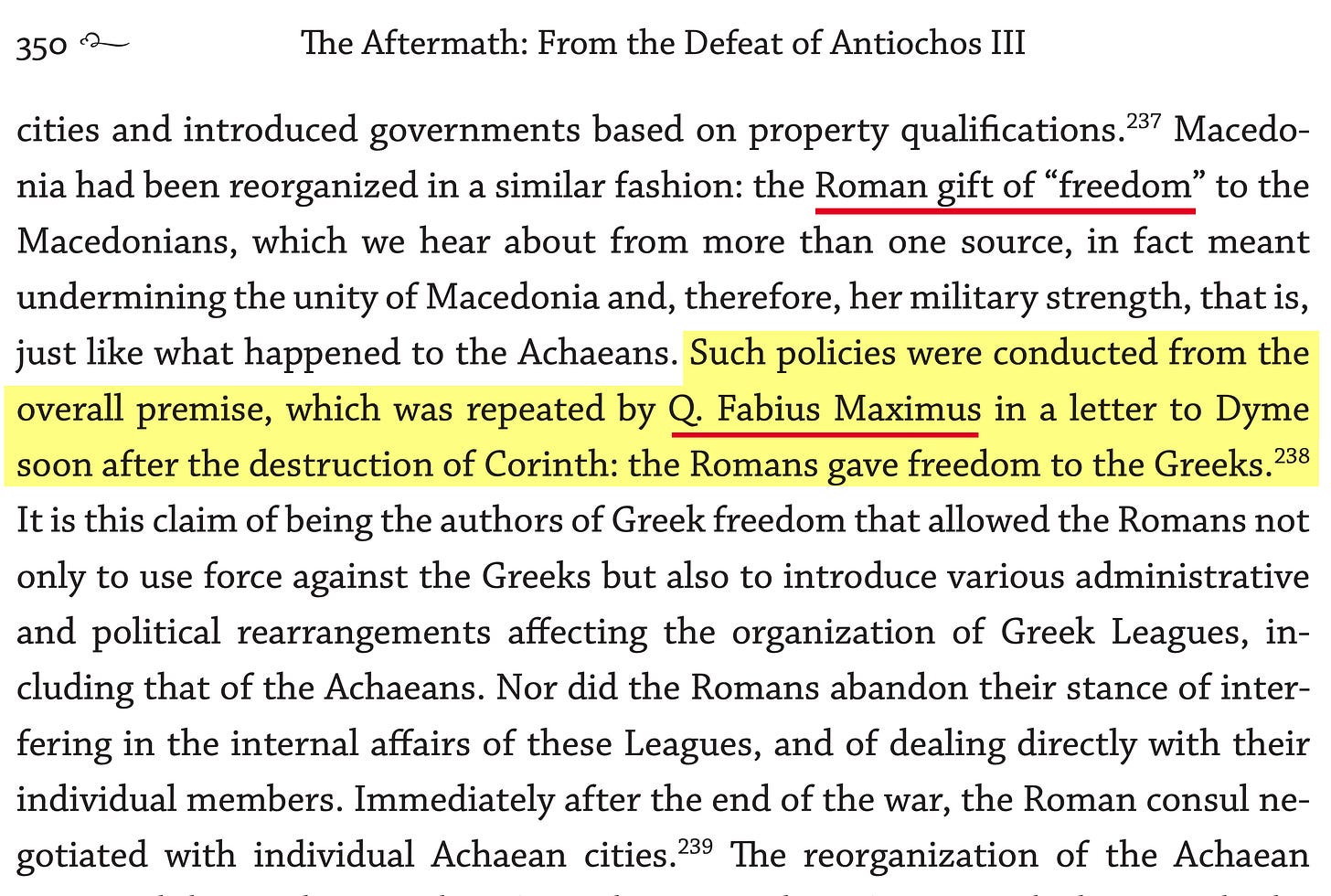
In a letter to the Greek city of Dyme after the destruction of Corinth in 146 BC, Fabius Maximus reiterated the Roman stance that Greece’s freedom was a Roman creation. This proclamation underscored the conditional nature of eleutheria (freedom from external domination) under Roman hegemony, transforming it from an inherent right into a privilege bestowed by Rome. Such assertions allowed Rome to justify its use of force and political reorganization while appearing as the champion of Greek independence (Page 349).
Autonomy and Fragmentation
Fabius Maximus’s letter exemplifies a broader Roman strategy: using autonomia (self-governance) to weaken Greek political unity. Rome fostered internal divisions by promoting the autonomy of individual city-states within larger alliances like the Achaean League. This fragmentation eroded these leagues' military and political significance, making them easier to control. Fabius’s statement reflected Rome’s calculated use of autonomy to neutralize collective Greek resistance (Page 350).
Roman Philhellenism and the Manipulation of Greek Identity
Fabius Maximus also played a role in the cultural dimension of Rome’s influence. His transportation of a colossal statue of Heracles from Tarentum to the Capitoline Hill symbolized the Roman appropriation of Greek cultural symbols. This act, while ostensibly honoring Greek traditions, served to integrate Greek identity into Roman imperial ideology, reinforcing the notion that Greek culture thrived under Roman patronage (Page 151).
Timeline of Roman Epistemological Warfare
200 BC—The Second Macedonian War Begins. Rome refrains from pillaging Greek territories and adopts the Greek language in diplomacy to garner support. This shift reflects Rome’s initial efforts to align with Greek ideals while positioning itself as a liberator (Pages 151–152).
196 BC – Declaration of Greek Freedom at Isthmia: Titus Quinctius Flamininus proclaims eleutheria (freedom from external domination) for Greek city-states, framing Rome as the defender of Greek independence. This declaration begins the Roman redefinition of freedom as a gift rather than an inherent right (Page 276).
190 BC – Battle of Magnesia: Rome defeats Antiochos III, marking the end of Seleucid influence in Greece. Fabius Maximus’s ideological precedent of framing Rome’s actions as gifts of freedom continues, as liberty is granted selectively to Greek cities (Page 276).
146 BC – Destruction of Corinth: Corinth is destroyed following the Achaean League’s rebellion. In the aftermath, Fabius Maximus writes to Dyme, emphasizing that Greek freedom was a Roman creation, illustrating Rome’s full redefinition of eleutheria (freedom from external domination) and autonomia (self-governance) (Page 349).
Rome’s Strategy: Division and Redefinition
The Roman approach to autonomia (self-governance) and eleutheria (freedom from external domination) can be summarized as a strategy of divide and control. By promoting autonomia (self-governance) within alliances such as the Achaean League, Rome sowed internal divisions that rendered these groups militarily ineffective. Simultaneously, by proclaiming itself the guarantor of eleutheria (freedom from external domination), Rome positioned itself as the arbiter of Greek freedom, ensuring that no city-state or alliance could challenge its dominance.
This approach often allowed Rome to avoid direct occupation, instead relying on ideological and diplomatic control. As Dmitriev notes, Roman officials like Fabius Maximus exemplified this strategy by emphasizing Rome as the benefactor of Greek freedom in correspondence and decrees (Page 349).
Liberty as a Weapon
The concept of liberty (libertas in Latin) plays a crucial role in the book as a Roman redefinition of Greek ideals of eleutheria (freedom from external domination) and autonomia (self-governance). Unlike the Greek concepts, which were tied to inherent independence, Rome framed liberty as a conditional privilege granted by a higher authority. This transformation marked a pivotal shift in the intellectual and political framework of freedom in the Mediterranean world.
Overview of Liberty
Liberty as a Conditional Freedom - In contrast to eleutheria, which emphasized independence from external forces, Roman liberty (libertas) was often presented as a gift from Rome to its allies and subjects. It symbolized a limited form of freedom, where autonomy existed only under Roman approval. Liberty was both a tool of diplomacy and a justification for imperial control, ensuring that Rome’s subjects were integrated into its sphere of influence while maintaining the appearance of independence.
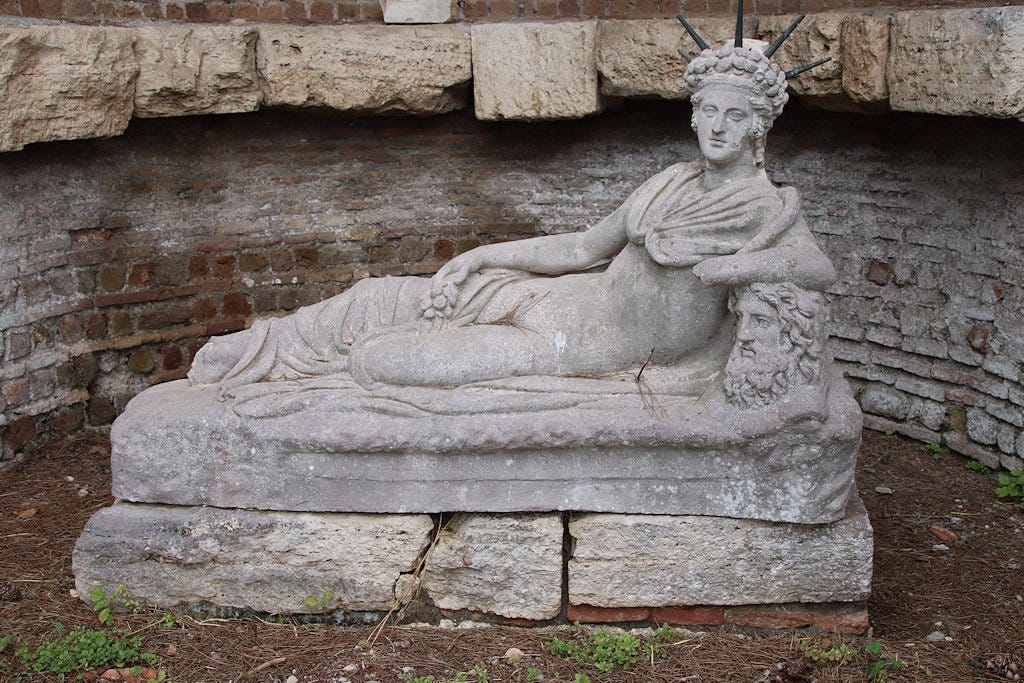
The Epistemological Weaponization of Liberty - The Roman use of liberty redefined the relationship between freedom and power. By granting liberty selectively, Rome reinforced its role as the guarantor of order and stability. This manipulation altered the perception of liberty from an inherent right to a granted status, aligning with Rome’s broader imperial objectives. The book positions this redefinition as a critical example of epistemological warfare, where language and ideology were reshaped to serve political ends.
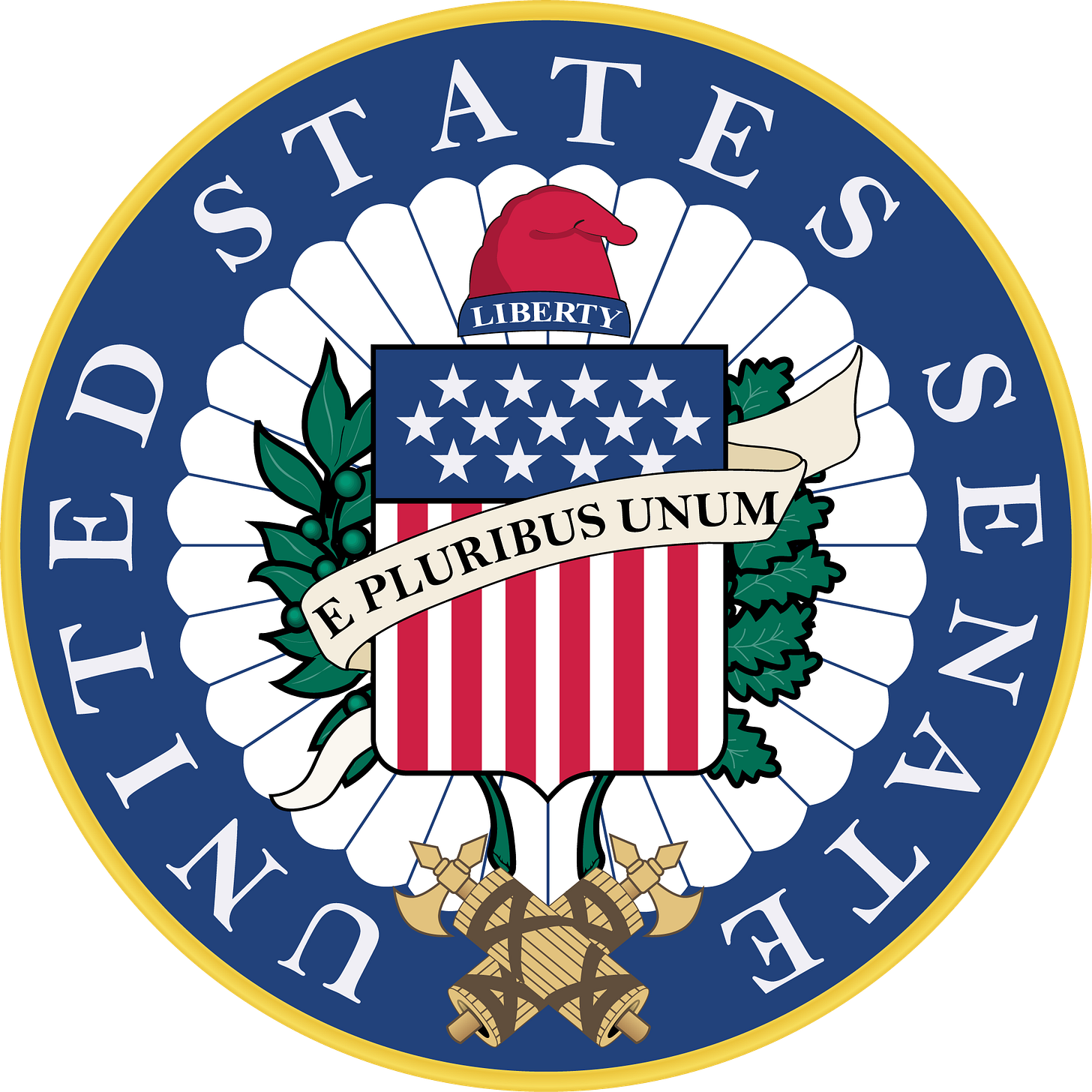
Detailed Analysis of Liberty
The Proclamation of Greek Liberty at Isthmia (196 BC) - Titus Quinctius Flamininus’s declaration at the Isthmian Games exemplifies the Roman approach to liberty. After Rome’s victory in the Second Macedonian War, Flamininus proclaimed liberty for the Greek city-states, stating that they were free from Macedonian control. However, this liberty was conditional: Greek states were expected to align with Rome’s interests. This act demonstrated the Roman strategy of embedding dominance within the language of freedom, reinterpreting eleutheria (freedom from external domination) as a Roman-granted privilege. (Pages 200–203)
Liberty as a Diplomatic Tool - Rome used liberty to secure loyalty and alliances. Cities and regions that cooperated with Rome were granted freedoms such as exemption from tribute or limited self-governance. For example, after the defeat of Antiochos III at the Battle of Magnesia (190 BC), Rome granted liberty to certain Greek cities while integrating others into its provincial framework. This selective application ensured compliance while maintaining the facade of independence. (Pages 215–230)
Liberty and the Destruction of Corinth (146 BC) - The destruction of Corinth following the Achaean League’s rebellion marked a turning point in the Roman use of liberty. After suppressing the rebellion, Rome dissolved the League and imposed direct control over Greece. While certain cities were nominally granted liberty, this liberty was tightly regulated, illustrating the extent to which the Roman concept of freedom was intertwined with control. (Pages 312–315)
Liberty within the Pax Romana - Under the Pax Romana, liberty became a key element of Roman governance. It was used to maintain order across the empire, with Rome granting limited freedoms to cities and regions while ensuring their subordination. This system transformed liberty into a mechanism for sustaining imperial stability, redefining it as a condition dependent on Roman oversight rather than an inherent state. (Pages 350–351)

Summary of Liberty
Definition: Liberty (libertas) in the Roman context referred to a conditional form of freedom granted by Rome, distinct from the inherent independence implied by eleutheria (freedom from external domination).
Key Events: Liberty was proclaimed at significant moments, such as the Isthmian Games (196 BC) and after the Battle of Magnesia (190 BC), to solidify Roman influence.
Manipulation: By granting liberty selectively, Rome integrated Greek city-states into its empire while maintaining the appearance of independence.
Control Mechanism: Liberty functioned as both a reward for loyalty and a justification for Roman dominance, demonstrating its role as a tool of epistemological warfare.
Legacy: The redefinition of liberty under Roman rule reshaped the intellectual framework of freedom, embedding Roman control within the language of autonomy and independence.
Timeline of Liberty
509 BC – Establishment of the Roman Republic - Liberty (libertas) emerged as a central value in Roman political identity, emphasizing freedom from monarchical rule. In this early context, liberty symbolized the collective rights of Roman citizens within the framework of the Republic.
196 BC – Proclamation of Greek Liberty at Isthmia - After Rome’s victory in the Second Macedonian War, Titus Quinctius Flamininus proclaimed liberty for the Greek city-states at the Isthmian Games. This act redefined eleutheria (freedom from external domination) as a Roman-granted condition, aligning Greek independence with Roman authority. (Pages 200–203)
190 BC – Battle of Magnesia - Rome defeated Antiochos III, ending Seleucid influence in Greece. Following this victory, liberty was granted selectively to Greek cities, demonstrating its use as a diplomatic tool to secure loyalty. (Pages 215–230)
146 BC – Destruction of Corinth - Rome destroyed Corinth following the Achaean League’s rebellion, dissolving the League and imposing direct control over Greece. The concept of liberty was retained in rhetoric but significantly curtailed in practice, illustrating its manipulation under Roman rule. (Pages 312–315)
27 BC – Establishment of the Roman Empire - With Augustus’s rise to power, the Pax Romana institutionalized liberty as a controlled condition within the empire. Greek city-states retained nominal freedoms under Roman oversight, embedding the redefined concept of liberty into the imperial system. (Pages 350–351)
Conclusion
Liberty in the Roman context diverged significantly from Greek ideals of eleutheria (freedom from external domination) and autonomia (self-governance). It represented a controlled form of freedom, granted and regulated by Rome to ensure compliance and stability. Through its strategic manipulation, liberty became a cornerstone of Roman diplomacy and governance, exemplifying the broader process of epistemological warfare that reshaped the Mediterranean political landscape.






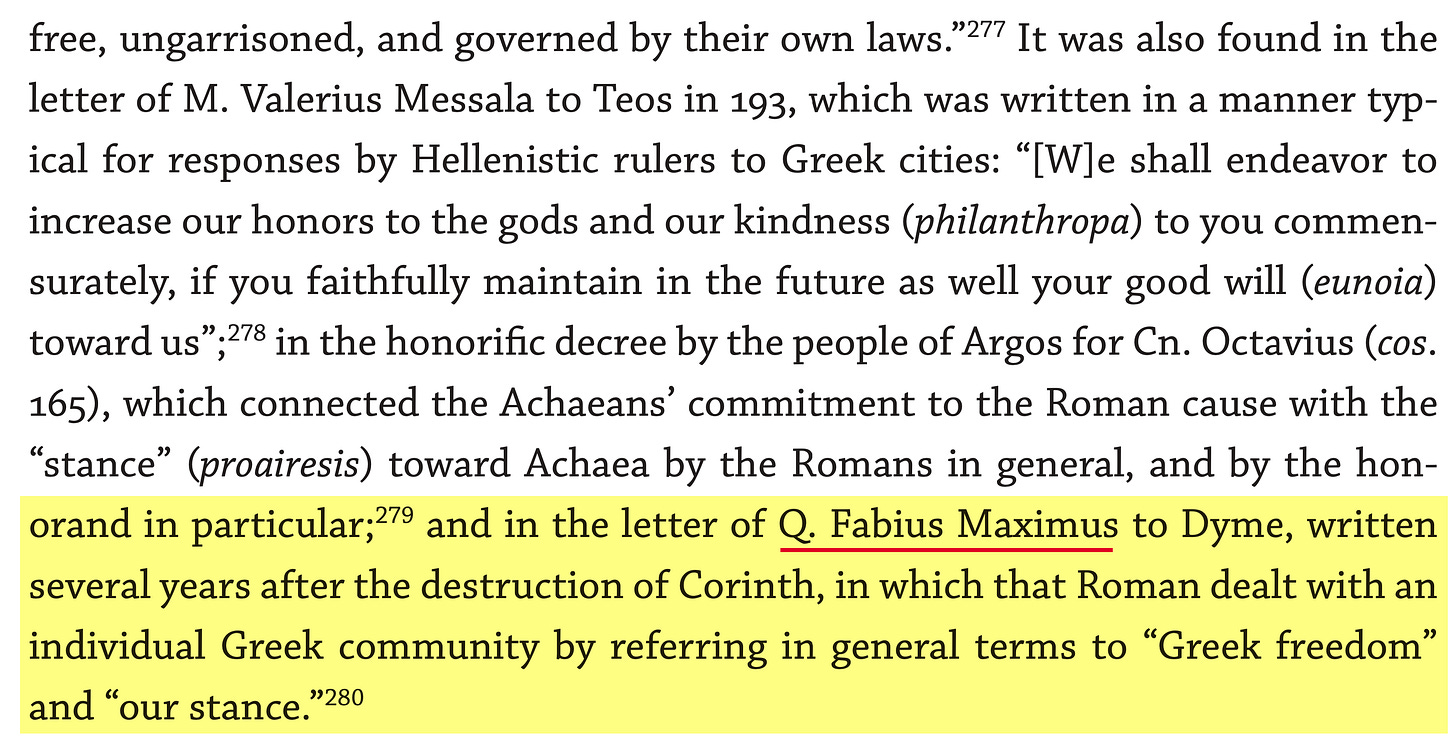


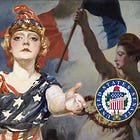
Have you heard the “I shit on your toga” story?
In the 4th century BC, the forces of the Roman Republic conquered all of central Italy. After the 48 years of war with the Samnites, victory for Rome came in 295 BC, increasing the Empire territory through Campania and Puglia. The forces of Rome were now very close to the Greek settlements of the Southern Peninsula.
The Roman Republic sent an emissary to the Spartan Greek colony of Taras, modern day Taranto in Puglia, in a peaceful effort to take over the Greek colony but it ended up very badly. Taras, by the way was named after son of Poseidon.
The Roman envoy arrived to Taras in formal togas in an attempt to impress the Greeks, but the Greeks thought they looked ridiculous and broke into fits of laughter. One of the Greeks, according to the historian Cassius Dio, shit (or shat or whatever floats your faeces!) all over the formal clothes of the chief envoy, Lucius Postimius Megellus, who promised the clothes would be washed in the blood of the Greek colony.
I think that it can be argued that the Greeks never bought into Romanisation despite their subjugation. Rather, over time the Greeks Hellenised the Romans despite defeat on the battlefield.
In the archaeological museum of Taranto the head of Heracles has been recreated and it is huge. Quite how the Romans managed to transport it to Rome is a feat in itself. Taranto today seems more proud of Magna Grecia than the Romans.
Very Interesting. I don't know when Fasces or the Phrygian cap first showed up - they may be symbols that existed long before their use by Rome - perhaps stolen from the Greeks. Their appearance on US seals, coins, and architecture - I think may have a more sinister meaning much like the satanic masonic symbols that are ever present. The Declaration of independence states: "......all men are created equal, that they are endowed by their Creator with certain unalienable Rights, that among these are Life, Liberty, and the Pursuit of Happiness".. which makes it clear that Liberty is bestowed by God and not governments. The use of the Phrygian cap (which is believed to have been given by slave owners/governments to individuals that had been granted their freedom from bondage and used to distinguish between those still enslaved) would be a poor symbol of freedom for a people that professed their Liberty was granted by God. What it suggest is that the Liberty granted the citizens or the newly formed entity was granted by an earthly source and is not an innate or inalienable right. Also the Fasces were carried by Lictors which were the private security of the nobility. Their presence on seals, within the chambers of government, and on our coins (1916 mercury dime) suggest to me that the US and its governments are the protectors of the real rulers.